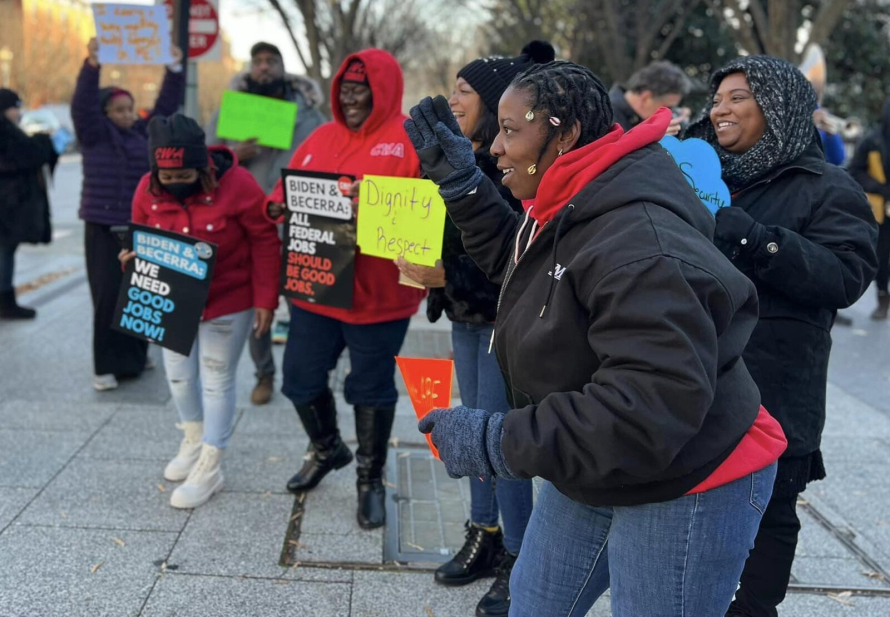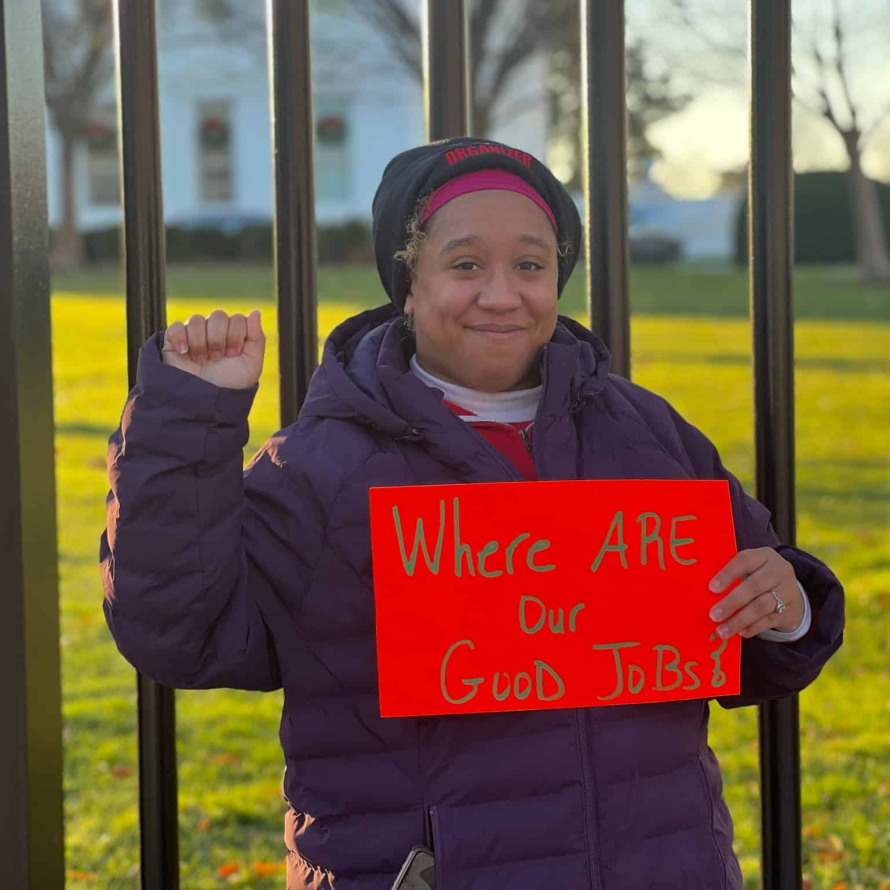Though they lived in a nation tilted against them, Black people built and rebuilt vital spaces of resistance, grounded in the secrets that they knew about themselves, about their community, their dignity, and their survival.
– Blair L.M. Kelley, “Black Folk: The Roots of the Black Working Class”

Context and Conversation
This year, we were inspired by a rich history of storytelling, research, and intellectual contributions that lift up Black women’s work and leadership in labor – along with solutions that shed light on the root and uprooting of racial capitalism and occupational segregation.
After months of shared study and discussion with our colleagues, we initiated a series of one-on-one conversations with workers followed by a worker roundtable focused on occupational segregation.
With this initial set of conversations, our aim was to capture the unfiltered wisdom and perspectives of Black women workers across the country employed in underpaid industries. We asked about how they define, articulate, and experience occupational segregation, the impact on their lives, and whether it is addressed in their current workplaces.
This initial set of conversations will inform a national occupational segregation report that we will release in the Spring of 2024, to amplify worker voice, dignity, and power.
Valuable Roles, Undervalued Workers

Throughout U.S. history, policy choices and systemic racism have disproportionately segregated Black women into critical occupations such as caregiving, teaching, agriculture, and healthcare. These undervalued roles, essential for the broader economy to function, have exacted a personal cost on Black women’s bodies and wellbeing, as well as that of their families and communities.
Despite challenges and oppressive forces, Black women throughout history have also resisted and dedicated themselves to their work with skilled precision, expertise, pride, and joy. As one of the roundtable workers told us, “I love what I do. I love giving care it’s a part of me.”
It is imperative to acknowledge the underlying causes of this injustice at the intersection of race and gender, and to rectify it. Black women are owed quality & family-sustaining jobs, respect in the workplace, fair wages, benefits, recognition, safety, the right to organize, and the ability to voice concerns freely and have them addressed without retaliation.
Addressing systemic injustices is crucial to ensuring Black women are accorded the dignity, reparations, and support they and their ancestors deserved. But often what goes unheard is that what fuels the desire for transformation is not about work alone, or about the worker identity.
Narrative Shift: Dreaming of Joy Beyond Work
We spoke with women representing diverse industries such as domestic work, retail, warehouse, caregiving, and reentry. They know that it takes great skill to do their work even while that skill is not recognized. They take pride in their work and desire real opportunities to transform their workplaces and take their careers to the next level, and for the right to contribute meaningfully to their loved ones and communities. The women we spoke with want a future where they can have joy with their loved ones and dream big – and their kids, grandkids, nieces, nephews, extended families, and communities, can dream big too.
A major obstacle to joy and dreams is the impact of the criminal legal system; in particular the nuanced ways criminalization and the criminal legal system shapes work for Black women, their families and communities.
We heard from women who support loved ones who are currently or formerly incarcerated. As Essie Justice Group has lifted up, “Women are the informal reentry system of this country.” Women impacted by the criminal legal system, directly or through family members, fill the void left by public policies that withdraw assistance for affected families, incurring debts and emotional burdens.
In our ongoing efforts to address occupational segregation and champion equitable opportunities for Black women workers, it is imperative that we not only implement concrete policy changes but also reshape public discourse by amplifying narratives rooted in justice and their calls to action.
Three compelling narratives stand out: Firstly, the acknowledgment that Black workers and communities possess inherent dignity and worth, underscoring the fundamental importance of respecting and valuing Black life and Black women.
Secondly, a recognition of the government’s responsibility to provide economic security, particularly in the context of dismantling occupational segregation and supporting reparative justice.
Lastly, the narrative of abundance reinforces the truth that living in a resource-rich country, we have the capacity to afford solutions that address the challenges faced by Black women workers, their families, and communities.
Popularizing these narratives is not just a rhetorical exercise; it is a strategic move to instigate tangible change across various sectors and movements, from workers’ rights and reentry to public health, racial justice, gender justice, and economic justice.
Recommended Reading: Occupational Segregation and Black Women Building Power
As we delved into the intricate topic of occupational segregation, our understanding was enriched by a range of insightful articles and research. For those interested in exploring this subject further, we offer the following abbreviated reading list that guided our study:
- Analysis of Black Women’s Historical Labor Trends & Systemic Barriers To Economic Mobility
- Centering Blackness: The Path to Economic Liberation for All
- Black Women in the United States and Unpaid Collective Work: Theorizing the Community as a Site of Production
- Because She’s Powerful
- An Economy for All: Building a “Black Women Best” Legislative Agenda
- Factsheet: U.S. occupational segregation by race, ethnicity, and gender
- I Dream Detroit
- Mississippi Is America: How Racism and Sexism Sustain a Two-Tiered Labor Market in the US and Constrict the Economic Power of Workers in Mississippi and Beyond
- Out of Prison & Out of Work: Unemployment among formerly incarcerated people
- The Limits of Educational Attainment in Mitigating Occupational Segregation Between Black and White Workers
- Structural Gendered Racism Revealed in Pandemic Times: Intersectional Approaches to Understanding Race and Gender Health Inequities in COVID-19
- THE OTHER SIDE OF THE STORM: What Do Black Immigrant Domestic Workers in the Time of Covid-19 Teach Us About Building a Resilient Care Infrastructure?
- The Magnolia Mother’s Trust
Toward a More Inclusive Future
The Black Women Workers Roundtable provides insights on race, gender, experiences with the criminal legal system, and socio-economic factors influencing Black women’s lives. It seeks to deepen understanding, highlight stories and strengths, and build a collaborative community. We’re excited to bring you more in Spring of next year. Together, we can reshape the narrative toward a brighter, more inclusive future.
Related to
The Latest News
All newsNELP and Partners Rally with Workers from Across the Country for the Empowering App-Based Workers Act

News Release
Stateline: Dozens of Cities, States Hiking Minimum Wages in 2026 Amid Federal Inaction

Press Clips
Minimum Wage Increases Coming in 2026 as Nationwide Affordability Crisis Deepens

News Release

